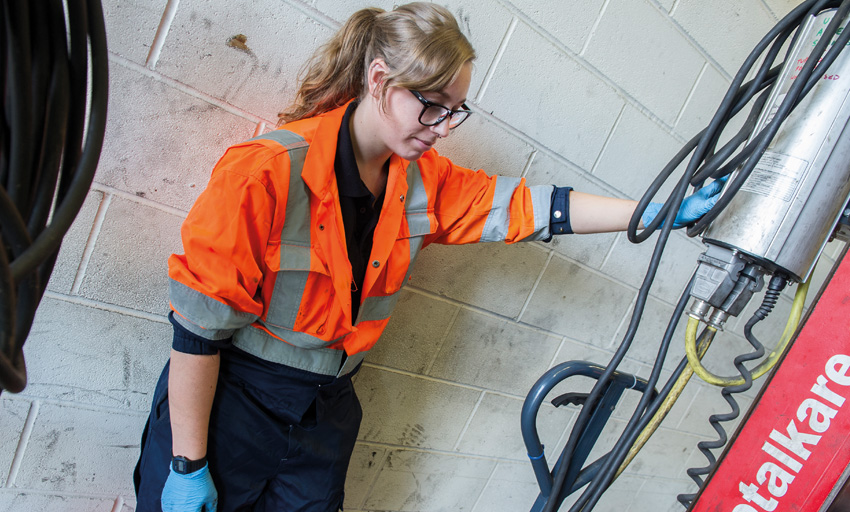Minister of State Niall Collins TD: Action Plan for Apprenticeship update

The importance of apprenticeship in society, both now and into the future, has never been more apparent than it is today writes Niall Collins TD, Minister of State at the Department of Further and Higher Education, Research, Innovation, and Science with responsibility for Skills and Further Education.
We are living in uncertain if not turbulent times. Largely as a consequence of the Covid pandemic and the war in Ukraine, cost-of-living pressures are impacting across society in Ireland. The response to Covid-19 has accelerated digital transformation in the workplace, changing the nature and capabilities required for occupations resulting in an increase in those needing to reskill.
The Action Plan for Apprenticeship 2021-2025 aims to deliver an apprenticeship system that is flexible and responsive, providing a strong value proposition for employers and potential apprentices.
I believe apprenticeship should be attractive and easy to engage with, and deliver high standards and sought-after qualifications, therefore embedding apprenticeship as a preferred route to skills development. A main ambition of the plan is to deliver 10,000 new apprentice registrations per annum by 2025; an increase of 62 per cent on 2019 figures.

“Without employers there would be no apprenticeships, which is why we are driving supports for employers.”
Minister of State Niall Collins TD
The Action Plan for Apprenticeship has been live for over one year now and already I can report that as a result of a €34 million investment under Budget 2022 targeting the expansion of apprenticeship, including the development of new programmes, and addressing the Covid-related backlogs, tangible progress has already been made. An additional capital investment of €17.2 million was allocated for SOLAS and the Higher Education Authority (HEA) to enable the development of further training capacity within the further education and training (FET) and higher education (HE) systems.
In 2022 alone, four apprenticeship programmes have been launched – bar manager, wind turbine maintenance technician, transport operations and commercial driving, and cybersecurity practitioner. There are currently 66 apprenticeship programmes on offer comprising 25 craft programmes and 41 new programmes introduced since 2016. A further 21 are in development in areas including agriculture, finance, and hospitality.
Amendments to the Industrial Training Act, 1967, included in the recently passed Higher Education Authority Bill, 2022, will widen the scope for new apprenticeship programmes in an expanded range of sectors such as agriculture.
New governance structures to oversee our apprenticeship system are now in place with the recently established National Apprenticeship Office (NAO) and National Apprenticeship Alliance (NAA). Together, they will drive real change in our apprenticeship system through the continued implementation of our Action Plan ensuring that the apprenticeship system will continue to be responsive to changes in society and in the economy.

The actions set out in the plan will deliver clarity for school-leavers, jobseekers, and career changers on the wide range of available apprenticeships. Through the Generation Apprenticeship media and billboard campaigns and their ground-breaking apprentice and employer of the year competitions, the NAO will continue to get the message out there that apprenticeship is open for business
All national apprenticeship programmes are promoted under the banner of Generation Apprenticeship and a dedicated website, apprenticeship.ie. Details including the range of programmes and entry requirements are available on this website. Apprenticeship has been included as an option on the CAO since November 2021.
Apprenticeship crosses boundaries. One of the main ambitions of the Action Plan is empowering people from under-represented and marginalised sections of society to take their rightful place in the system is vital to the success of apprenticeship.
Apprenticeship can provide individuals with a clear route to not only a job, but to a valued qualification and a clear career path, instilling hope and direction that may not otherwise have been readily apparent. The imminent establishment of the Equity of Access subcommittee of the NAA will help ensure that apprenticeship is more reflective of the national population.
Already, as part of Budget 2023, I announced a once-off reduction of up to 33 per cent in the contribution fee for apprentices and additional funding for social inclusion measures in apprenticeship, such as a bursary for apprentices from under-represented groups and the expansion of the Access to Apprenticeship (ATA) initiative.
Funding will also be made available through the recently announced pilot Traveller Apprenticeship Incentivisation Programme in 2023 for a Traveller-specific package of financial supports, to increase participation and retention in apprenticeship.
Without employers there would be no apprenticeships, which is why we are driving supports for employers. This year saw the introduction of apprenticeship employer grant of €2,000 per eligible apprentice and the extension of the gender bursary of €2,666 per eligible apprentice to the employers of apprentices on all programmes with more than 80 per cent of a single gender registered. This work will continue into 2023 by building on existing supports for consortia and employers, particularly through the work of the NAO and use of the Regional Skills Fora.
Already we can see the impact of these measures on our apprenticeship system. Due to these measures and other supports aimed at simplifying the process for employers, there are currently almost 9,000 employers and over 26,000 apprentices. Government will also ensure that the public sector plays its part by delivering high-quality public sector employment and training opportunities, underpinning the ongoing reform of our public service.

I am confident that these numbers will increase as apprenticeships can help companies to compete in the modern marketplace and make their organisations more competitive. In addition to building a company’s skills base, providing quality training helps with staff loyalty and retention, thus adding to the benefits of apprenticeships.
We will continue to invest in building the apprenticeship system in 2023 given the Government’s clearly articulated ambition set out in the Action Plan. I am satisfied that the suite of initiatives included in the Apprenticeship Action Plan will provide strong momentum to making our apprenticeship system a strong value proposition for employers and potential apprentices and to boosting the presence of currently under-represented groups in our apprenticeship population.





